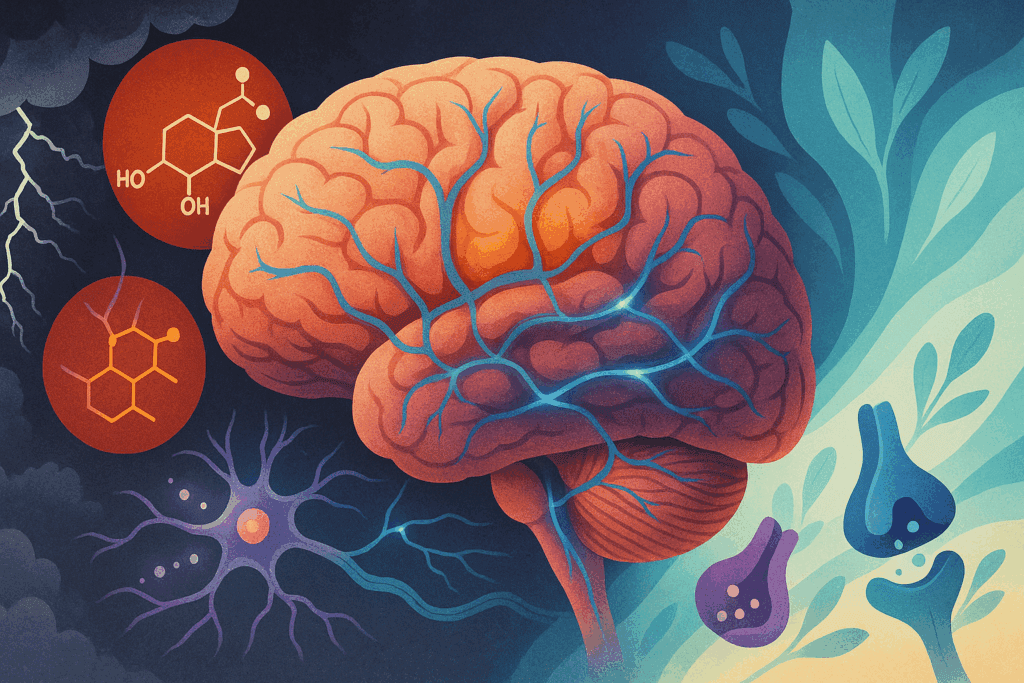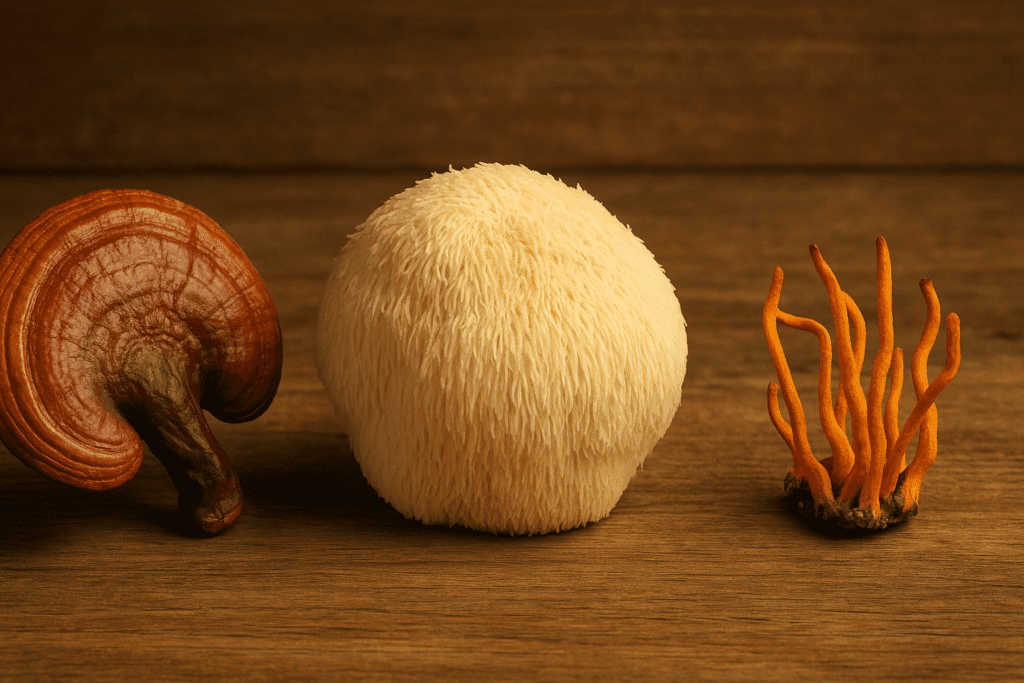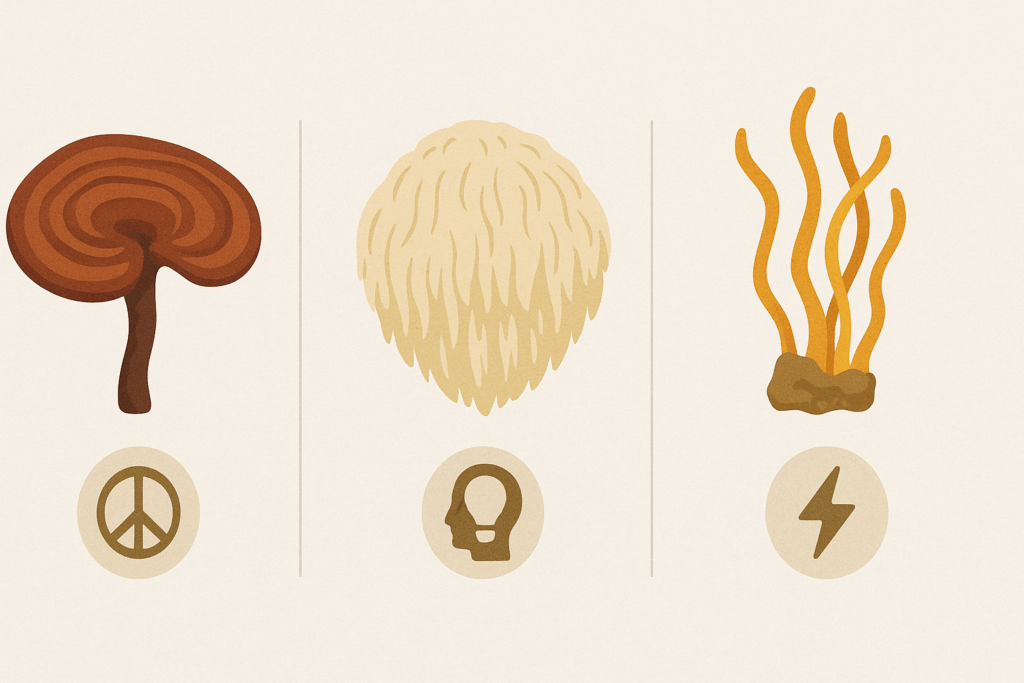Unlocking Nature’s Wisdom: Why Mushrooms for Stress Relief Are Gaining Scientific Momentum
In recent years, the convergence of neuroscience, mycology, and wellness has illuminated the remarkable cognitive benefits of nootropic mushrooms for stress relief. These fungi, long revered in traditional medicine across cultures, are now being explored through the lens of modern research for their neuroprotective and adaptogenic properties. The term “mushrooms for stress relief” has emerged not merely as a wellness buzzword but as a grounded and evidence-informed avenue for managing stress, anxiety, and cognitive fatigue. Unlike quick-fix synthetic solutions, nootropic mushrooms offer a multifaceted approach to brain health, acting on multiple neural pathways that influence memory, mood, and resilience to stress.
Modern consumers, particularly college-educated and health-conscious individuals, are increasingly seeking natural and sustainable ways to manage the pressures of modern life. With the mounting evidence supporting the effectiveness of calming mushrooms in promoting both mental clarity and emotional balance, this renaissance of interest in mushroom-based interventions signals a shift toward holistic well-being. In this article, we delve into the science, applications, and practical uses of nootropic mushrooms, unraveling how they work to enhance memory and reduce anxiety, and why they may be considered among the best mushroom supplements for anxiety and stress resilience today.
You may also like: The Ultimate Guide to the Best Nootropic Mushrooms for Memory and Cognitive Enhancement

Exploring the Neurochemical Roots of Stress and Anxiety
To appreciate how mushrooms support stress relief, it’s essential to understand what stress does to the brain. Acute stress triggers the hypothalamic-pituitary-adrenal (HPA) axis, flooding the body with cortisol and adrenaline. While helpful in short bursts, chronic activation of this system leads to cognitive decline, mood disturbances, and impaired memory formation. Persistent stress can shrink the hippocampus, weaken neural plasticity, and deplete neurotransmitters like serotonin and dopamine, both of which are critical for mood stability and cognitive function.
Anxiety, often co-occurring with stress, manifests through excessive worry, rumination, and physiological symptoms such as elevated heart rate and insomnia. Conventional treatments, such as selective serotonin reuptake inhibitors (SSRIs) and benzodiazepines, can provide relief but often come with side effects and dependency risks. Herein lies the growing appeal of functional fungi. Unlike synthetic drugs, mushroom supplements for anxiety offer adaptogenic benefits that modulate rather than suppress stress responses, promoting equilibrium across multiple systems of the brain and body.
Emerging studies show that certain mushrooms enhance the expression of brain-derived neurotrophic factor (BDNF), a protein essential for learning and memory. They also interact with GABAergic and serotonergic pathways—mechanisms closely tied to the symptoms of stress and anxiety. This dual action not only improves cognitive clarity but also contributes to emotional regulation, making these natural remedies particularly valuable in stress management.

Adaptogens in Action: How Mushrooms Help Rebalance the Brain
Adaptogens are natural substances that help the body adapt to stress by normalizing physiological functions. Nootropic mushrooms like Reishi, Lion’s Mane, and Cordyceps fall squarely into this category. Reishi, for instance, has been traditionally used in Chinese medicine for centuries to promote calm and longevity. Its modern application as one of the most calming mushrooms is supported by research indicating it helps regulate the HPA axis, reducing cortisol levels and promoting restful sleep.
Lion’s Mane, meanwhile, is widely studied for its neuroregenerative properties. It stimulates the synthesis of Nerve Growth Factor (NGF), a protein that supports the survival and growth of neurons. This mechanism not only enhances memory and learning but also counteracts the cognitive decline associated with chronic stress. By preserving neuronal integrity, Lion’s Mane may be considered one of the best mushrooms for anxiety and stress-induced cognitive impairment.
Cordyceps, although primarily known for boosting energy and stamina, also plays a role in stress adaptation. It enhances mitochondrial function, improves oxygen utilization, and supports the endocrine system. Together, these actions result in increased physical and mental resilience. Mushroom capsules for anxiety that include a blend of these adaptogens offer synergistic effects that surpass the benefits of isolated compounds. The integrative use of such mushrooms for relaxation and cognitive balance demonstrates their versatility and potential as long-term wellness tools.

The Cognitive Uplift: Enhancing Memory and Focus Naturally
Stress impairs the prefrontal cortex, the region responsible for executive function, decision-making, and working memory. Chronic stress not only dulls cognitive sharpness but also accelerates age-related decline. Nootropic mushrooms counter these effects by fostering a neurochemical environment conducive to clarity and retention. Their impact on BDNF and NGF levels supports the structural integrity of brain regions involved in cognition.
Lion’s Mane, in particular, stands out for its memory-enhancing potential. Clinical studies in older adults show improved cognitive performance and mood following consistent supplementation. These findings are echoed in younger populations, especially students and professionals seeking mental stamina. As a non-stimulant cognitive enhancer, Lion’s Mane avoids the crash associated with caffeine or amphetamine-based nootropics.
The synergistic use of calming mushrooms in formulas designed for brain health not only enhances cognitive performance but also stabilizes mood. For individuals dealing with both anxiety and mental fog, such dual-action interventions are invaluable. Mushroom tea for anxiety, made with a calming blend of nootropic species, provides a ritualistic and therapeutic means of support. When integrated into a balanced lifestyle, these mushrooms act as allies in cultivating long-term cognitive wellness.
Mushrooms for Stress Relief: A Review of Scientific Evidence
The growing body of peer-reviewed literature on mushrooms for stress relief lends credibility to their widespread use. In animal studies, Reishi has been shown to decrease corticosterone levels, an analog of cortisol, while improving behavioral responses to stress. Human trials echo these findings, with participants reporting improved sleep quality, reduced fatigue, and enhanced emotional well-being after regular Reishi intake.
Lion’s Mane continues to garner attention for its antidepressant-like effects, attributed to its ability to enhance neurogenesis and reduce inflammation. A randomized controlled trial published in Biomedical Research found that women who consumed Lion’s Mane cookies daily experienced significant reductions in depression and anxiety scores. This study underscores the compound’s potential as a mushroom supplement for anxiety that supports both mood and cognitive resilience.
Cordyceps, although less directly linked to mood, contributes by supporting energy metabolism and reducing the subjective experience of fatigue—a key symptom of chronic stress. Together, these effects position nootropic fungi as holistic interventions. Whether consumed as mushroom capsules for anxiety or brewed into mushroom tea for anxiety, the delivery method may vary, but the therapeutic potential remains robust.

Practical Applications: Using Mushrooms for Sleep and Anxiety Relief
For those seeking practical ways to incorporate mushrooms into their routine, there are several convenient and effective options. Mushroom supplements for anxiety are available in capsule, powder, and liquid extract forms, each offering bioavailable doses of active compounds. The key lies in consistency and choosing products that are third-party tested for purity and potency.
Mushroom tea for anxiety offers a calming, ritualistic alternative to pills. It’s particularly effective when made with a combination of Reishi and Lion’s Mane, steeped in hot water with calming herbs like chamomile or lavender. The warmth and aroma of the tea engage multiple senses, reinforcing its relaxing effects. For individuals with trouble sleeping, consuming this tea an hour before bed can promote deeper, more restorative rest.
Mushrooms for sleep and anxiety also appear in functional beverages and edibles, offering easy integration into daily life. Whether it’s a morning coffee infused with Lion’s Mane for focus or an evening tonic with Reishi for relaxation, these formulations align with the circadian rhythms that govern our mental and physical states. Mushroom capsules for anxiety can be taken in the morning to build resilience, while mushroom tea serves as an evening wind-down ritual. Such targeted use enhances their adaptogenic effects, helping the body adapt to the stressors of modern life with grace.
Understanding the Best Mushroom for Anxiety: What Science Recommends
Among the many options, the best mushroom for anxiety depends on an individual’s unique neurobiology and stress profile. However, Reishi is often cited for its tranquilizing effects on the nervous system, making it an excellent evening supplement. Its influence on the parasympathetic nervous system promotes relaxation without sedation, a rare and valuable property in the landscape of anti-anxiety tools.
Lion’s Mane, though more stimulating than Reishi, supports long-term resilience by improving brain plasticity. For those whose anxiety is tied to cognitive decline or burnout, Lion’s Mane offers a restorative boost. When taken regularly, it may support emotional balance and memory—especially useful for students, professionals, and caregivers under constant mental strain.
Cordyceps, while not traditionally viewed as an anxiolytic, plays a supportive role by boosting energy and combating fatigue. For individuals whose anxiety is exacerbated by exhaustion, Cordyceps serves as a foundational tonic. Blended formulations that combine these mushrooms offer a comprehensive approach, catering to the diverse pathways through which stress manifests. Choosing the best mushroom supplement for anxiety thus involves understanding both the science and the self—what your body responds to, what your mind needs, and how your lifestyle supports your goals.

Nootropic Stacking: Enhancing Efficacy with Synergistic Combinations
Just as the brain operates through interconnected networks, nootropic stacking involves combining complementary substances for amplified benefits. In the case of mushrooms for stress, this often means blending Reishi for calming effects, Lion’s Mane for cognitive support, and Cordyceps for vitality. The concept is to address multiple facets of stress physiology—neurological, endocrine, and immune—simultaneously.
Some advanced blends also include other adaptogens like Rhodiola Rosea or Ashwagandha, which work alongside nootropic mushrooms to deepen their effect. When done thoughtfully, this kind of formulation supports allostatic load reduction—the body’s ability to maintain stability through change. This is especially critical in today’s demanding environments, where chronic stress erodes mental clarity and physical vitality alike.
Mushroom capsules for anxiety often incorporate such synergistic formulas, streamlining the process for consumers. However, individuals can also create their own nootropic stack by researching clinically validated doses and preparing their own blends using high-quality powders. The key to success in stacking is consistency, patience, and observation—giving each combination time to take effect while monitoring how it aligns with cognitive and emotional goals.
Why Mushrooms for Stress Relief Belong in the Future of Mental Wellness
As we redefine mental wellness in the 21st century, the integration of natural, low-risk interventions is becoming essential. Mushrooms for stress relief offer not only therapeutic efficacy but also sustainability, cultural depth, and holistic engagement. These fungi represent more than a temporary solution; they embody a new paradigm of brain health rooted in nature’s design.
The future of nootropic mushrooms lies in continued research, particularly human clinical trials that quantify their impact on biomarkers like cortisol, serotonin, and BDNF. With growing consumer awareness and investment in natural medicine, the momentum is unlikely to slow. What sets mushrooms apart from other wellness trends is their profound compatibility with the human body, acting not as a foreign agent but as a facilitator of balance.
Public health strategies would benefit from including these fungi in mental health toolkits, especially for populations burdened by chronic stress. Educational institutions, workplaces, and healthcare providers can help normalize their use by emphasizing evidence-based outcomes and proper sourcing. As functional food becomes a cornerstone of wellness, calming mushrooms are poised to play a central role.

Integrating Mushrooms for Stress Relief into Academic and Professional Settings
Incorporating mushrooms for stress relief into academic and professional routines is an emerging trend among individuals who face high cognitive demands. University students often juggle lectures, exams, and part-time jobs, making them especially vulnerable to burnout. The pressure to perform academically while maintaining social and extracurricular commitments can create a state of chronic stress. In such cases, nootropic mushrooms offer a compelling, evidence-based intervention. Reishi and Lion’s Mane, in particular, can help students improve focus and emotional regulation without the downsides of stimulants, which are often misused during exam periods.
In corporate environments, the emphasis on productivity, constant connectivity, and multitasking can contribute to decision fatigue and emotional exhaustion. Mushroom supplements for anxiety provide a natural and sustainable alternative to traditional stimulants like caffeine. Reishi tea or capsules can be used in place of a second cup of coffee during the workday to promote calm and support long-term focus. Lion’s Mane capsules, when taken consistently, support task switching and memory retention—two functions often compromised under occupational stress.
Furthermore, wellness initiatives in workplaces and universities are beginning to embrace functional foods. Offering calming mushrooms as part of wellness programs or campus health services signals a broader recognition of their value. Whether included in vending machines, mental health packages, or workshop offerings, these fungi can support communal and personal resilience alike. The result is a cultural shift towards mindful consumption, where mushrooms for relaxation are seen not as fringe remedies but as essential components of modern health management.
Bridging Traditional Wisdom and Modern Neuroscience
One of the most fascinating aspects of using mushrooms for stress is the convergence of ancient medicinal knowledge and contemporary scientific discovery. Cultures across Asia, including Chinese, Tibetan, and Japanese traditions, have used fungi like Reishi and Cordyceps for centuries to enhance vitality, longevity, and emotional balance. These traditions viewed mushrooms not merely as healing tools, but as sacred, multidimensional elements of health. The reverence for fungi was grounded in observational wisdom, often passed through generations.
Modern neuroscience, through the lens of pharmacognosy and neurobiology, has begun validating these age-old practices. The identification of beta-glucans, hericenones, erinacines, and triterpenoids in these mushrooms has helped explain their bioactivity. For instance, Lion’s Mane’s ability to support the growth of nerve cells aligns closely with its traditional use in promoting mental clarity. Similarly, the immunomodulatory and sedative effects attributed to Reishi now find support in studies measuring cytokine levels and nervous system regulation.
By integrating traditional frameworks with data-driven insights, we can create more nuanced approaches to mental health. This blend allows for protocols that are culturally respectful yet scientifically robust. Educational content, product labeling, and clinical applications that highlight both sources of knowledge empower consumers to make informed choices. In doing so, mushrooms for sleep and anxiety become part of a narrative that honors the past while serving the future. This synthesis marks a pivotal evolution in the landscape of cognitive and emotional care.
Personalized Wellness: Tailoring Mushroom Use for Individual Needs
Although nootropic mushrooms offer broad-spectrum benefits, their effects can vary based on an individual’s physiology, lifestyle, and mental health status. Personalizing the use of mushrooms for stress and anxiety ensures optimal outcomes. For example, someone with high-functioning anxiety who experiences constant overthinking and tension might benefit more from Reishi’s calming properties. Meanwhile, an individual experiencing brain fog and low motivation may respond better to the neurostimulating effects of Lion’s Mane.
Health professionals can help guide users toward the best mushroom for anxiety based on assessments of sleep quality, energy levels, and emotional patterns. When possible, working with a naturopathic doctor or integrative health coach ensures that mushroom supplements are combined with lifestyle interventions such as sleep hygiene, nutrition, and mindfulness practices. This holistic approach magnifies the benefits and supports sustainable change.
Additionally, tracking one’s response to different forms—mushroom capsules, mushroom tea, or functional food—can clarify what works best for personal goals. For some, the ritual of brewing mushroom tea for anxiety provides a meditative pause in the day, reinforcing its calming effects. For others, the convenience of capsules ensures compliance during travel or demanding schedules. The key is to respect the individuality of each body and mind while leveraging the profound versatility of calming mushrooms.

Building Resilience Through Daily Rituals with Calming Mushrooms
Creating daily rituals with calming mushrooms not only enhances their effectiveness but also supports mental resilience through consistency and intention. Rituals offer structure in a world that often feels chaotic, anchoring individuals in moments of stillness and reflection. Whether it’s a morning elixir with Cordyceps and Lion’s Mane or an evening wind-down tea with Reishi, these practices transform supplements into experiences.
These rituals can also become community-building activities. In workplaces, mushroom-infused drinks can be shared during breaks or wellness meetings, fostering a culture of collective care. In academic settings, students can form support circles that include functional wellness tools like mushroom tea for anxiety, alongside breathing techniques or journaling prompts. These collective rituals reduce isolation and reinforce the normalization of seeking support.
Moreover, integrating mushrooms into rituals enhances neuroplasticity by pairing the consumption of these nootropics with emotionally salient experiences. Over time, the brain begins to associate the act of taking mushrooms with a sense of calm and empowerment. This pairing helps reinforce positive behavioral loops and reduces the likelihood of reverting to less adaptive coping mechanisms. As a result, the best mushroom supplement for anxiety becomes more than a tool—it becomes part of a sustainable lifestyle that promotes cognitive vitality and emotional resilience.
Frequently Asked Questions About the Surprising Benefits of Mushrooms for Stress Relief
1. How do mushrooms for stress relief interact with other medications?
Mushrooms for stress relief can interact differently depending on the medication involved. For instance, Reishi mushrooms may amplify the effects of blood pressure or anticoagulant medications due to their mild blood-thinning properties. Lion’s Mane may increase acetylcholine levels, which could theoretically interact with cognitive enhancers or antidepressants. It’s critical to consult with a healthcare provider if you’re taking prescription medications, especially for anxiety, depression, or cardiovascular conditions. Integration should be guided by professional assessment to avoid potential contraindications.
2. What are some advanced ways to use calming mushrooms beyond capsules and teas?
While mushroom capsules for anxiety and mushroom tea for anxiety are convenient, more creative methods of use are gaining popularity. Culinary integration—such as adding powdered Lion’s Mane or Reishi to broths, smoothies, or energy bars—can turn supplementation into a nourishing ritual. Tinctures and dual-extract sprays are also emerging, allowing for more targeted and flexible dosing. Topical applications with Cordyceps or Reishi-infused balms are being explored in stress-relief bodywork and massage therapy. These innovative delivery methods broaden the accessibility and functionality of calming mushrooms in daily wellness.
3. Are there specific lifestyle factors that affect how well mushrooms for stress relief work?
Absolutely. The efficacy of mushrooms for stress relief often depends on diet, sleep hygiene, exercise, and emotional habits. Individuals with nutrient deficiencies, high sugar intake, or irregular sleep may notice diminished benefits from even the best mushroom supplement for anxiety. Mushrooms act best when they are part of a holistic lifestyle that supports neuroplasticity and hormonal balance. Including them alongside practices such as meditation, breathwork, or yoga tends to yield more robust results over time.
4. What emerging scientific studies are being conducted on mushrooms for sleep and anxiety?
Several ongoing clinical trials are exploring the role of mushrooms for sleep and anxiety in both clinical and wellness populations. Researchers are investigating how Lion’s Mane affects REM sleep duration, hippocampal regeneration, and social anxiety biomarkers. Reishi is being studied for its impact on circadian rhythm genes and melatonin levels. Other studies are assessing mushroom supplement for anxiety as adjunctive therapy in cognitive behavioral treatment. These findings may help establish standardized dosages and further legitimize mushrooms for relaxation in clinical settings.
5. Can you combine nootropic mushrooms with traditional anti-anxiety supplements or herbs?
Yes, combining nootropic mushrooms with other natural adaptogens or calming herbs is a common practice. Blending Reishi with Ashwagandha, for instance, may amplify cortisol-lowering effects, while Lion’s Mane pairs well with Bacopa for cognitive clarity. However, stacking should be done mindfully, as overlapping effects on neurotransmitters could lead to excessive sedation or stimulation. People using multiple supplements should track their mood and cognition to avoid adverse effects. Consultation with an integrative health professional is recommended for complex regimens.
6. How are mushrooms for stress relief being adapted into mental health tech and biohacking?
The intersection of mushrooms for stress relief with technology is a fascinating frontier. Biohackers are using wearable devices to monitor heart rate variability (HRV) and track the stress-reducing impact of mushroom stacks. Neurofeedback devices combined with mushroom protocols are being tested to optimize brainwave activity. Some apps are beginning to incorporate functional mushroom intake tracking alongside mood journaling. This integration brings data-driven precision to mushroom-based wellness and may revolutionize the customization of mushroom supplement for anxiety regimens.
7. Can mushrooms for stress be used preventatively rather than reactively?
Yes, a preventative approach is one of the most powerful uses of mushrooms for stress. When taken regularly, these mushrooms can build stress resilience by supporting baseline nervous system regulation. Preventative use ensures consistent neurotransmitter balance and promotes long-term cognitive integrity. Rather than waiting for symptoms of anxiety or burnout to emerge, integrating mushrooms early—especially during predictable stress cycles like exams or job transitions—can serve as a buffer. This makes them invaluable for long-term mental health maintenance.
8. What social or cultural barriers affect the adoption of calming mushrooms in wellness routines?
Despite growing interest, some populations are still hesitant to embrace calming mushrooms due to cultural misconceptions. The historical conflation of medicinal mushrooms with psychedelic varieties can deter more conservative users. Additionally, some Western medical practitioners may be unfamiliar with or skeptical about traditional Eastern uses of functional mushrooms. Overcoming these barriers requires robust education, cultural sensitivity, and more research published in mainstream medical journals. Social proof and influencer-led transparency can also accelerate widespread acceptance of mushrooms for stress.
9. How do mushrooms for sleep and anxiety support cognitive diversity and neurodivergent individuals?
Individuals with ADHD, autism spectrum conditions, or sensory processing differences may find tailored benefits from mushrooms for sleep and anxiety. Lion’s Mane’s neurotrophic effects can support attentional control and executive functioning, while Reishi’s grounding influence helps regulate sensory overload. Mushroom capsules for anxiety offer a predictable and consistent method of delivery, which many neurodivergent people appreciate. As personalized medicine evolves, mushrooms for relaxation may become part of neurodivergence-friendly protocols. Ongoing research is crucial for ensuring safe and inclusive usage.
10. What does the future hold for mushroom-based interventions in stress management?
The future of mushrooms for stress looks promising, particularly as interest grows in integrative and personalized healthcare. Innovations include microencapsulation technologies that enhance bioavailability and reduce taste aversion. AI-generated health protocols may begin including the best mushroom for anxiety based on genetic and biometric analysis. Educational platforms are likely to feature more certified courses on fungi-based healing. Regulatory bodies are also starting to explore guidelines to ensure safety and efficacy in commercial products. Ultimately, mushrooms for stress relief may become as mainstream as probiotics are today, shaping the next generation of emotional and cognitive healthcare.
Conclusion: Embracing the Therapeutic Power of Mushrooms for Stress Relief and Cognitive Vitality
In a world increasingly defined by overstimulation, burnout, and fragmented attention, the quest for sustainable stress relief has never been more urgent. Nootropic mushrooms offer a rare convergence of tradition and science, providing a multifaceted solution that addresses both the emotional and cognitive dimensions of stress. By enhancing neuroplasticity, regulating cortisol, and supporting neurotransmitter balance, these fungi position themselves as valuable allies in the pursuit of mental clarity and emotional resilience.
Whether consumed as mushroom tea for anxiety, taken as mushroom capsules for anxiety, or used in stacked supplements for cognitive enhancement, the practical applications of these fungi are both diverse and impactful. For individuals navigating the demands of modern life—be they students, professionals, caregivers, or creatives—mushrooms for stress relief represent a path toward holistic well-being.
With consistent use, informed by scientific insight and guided by personal experience, these natural tools can offer long-term benefits that rival or complement conventional treatments. As more evidence emerges and societal openness grows, integrating calming mushrooms into our wellness routines may become not only common but essential. In embracing their potential, we take a meaningful step toward a more balanced, focused, and emotionally grounded future.
Further Reading :
Mushroom Supplements for Relaxation
Medicinal Mushrooms for Stress and Anxiety
Best Mushroom for Anxiety and Depression and How to Use Them
